Archive for May, 2011
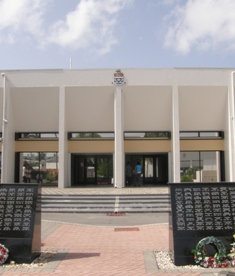
Teen stands solo for murder
 (CNS): Following a successful application by attorneys representing 18-year-old Jordon Manderson, on Tuesday the West Bay teen will face trial on his own for the murder of Marcos Duran. Although the crown has also charged Raziel Omar Jeffers with the same crime, ongoing legal representation problems led the judge to sever the two defendants' trials. Manderson was arrested and charged in the wake of the fatal March 2010 shooting in West Bay and has been in custody ever since. Three trial dates have already been postponed because of Jeffers’ lack of representation and Justice Charles Quin ruled Friday that, in the interests of justice, Manderson’s trial must go ahead, but without a lawyer Jeffers could not be tried.
(CNS): Following a successful application by attorneys representing 18-year-old Jordon Manderson, on Tuesday the West Bay teen will face trial on his own for the murder of Marcos Duran. Although the crown has also charged Raziel Omar Jeffers with the same crime, ongoing legal representation problems led the judge to sever the two defendants' trials. Manderson was arrested and charged in the wake of the fatal March 2010 shooting in West Bay and has been in custody ever since. Three trial dates have already been postponed because of Jeffers’ lack of representation and Justice Charles Quin ruled Friday that, in the interests of justice, Manderson’s trial must go ahead, but without a lawyer Jeffers could not be tried.
Razial, who is also from West Bay, was charged several months after Manderson and the crown moved to join the defendants on the indictment but encountered problems from the start when Jeffers, who was already facing one murder charge, had difficulties finding appropriate representation. Attempts by the crown to join the two defendants dragged on, causing persistent delays for Manderson, who had first expected to be tried last November.
The judge acknowledged the difficulty this presented the crown, which will have to recall witnesses and risks getting different results for one crime. However, he stated that his “overriding concern” was the length of time Manderson had been waiting for trial.
The murder took place on 11 March at an apartment block in Maliwinas Way, just off North West Point Road, at around 7:30 in the evening, when Marcos Mauricio Gauman Duran, an Ecuadorian national who was believed to have been collecting cash in relation to illegal gambling, was gunned down in what was suspected to be a robbery. Manderson, who was sixteen at the time, also received a severe gunshot wound to his leg on the same night and was arrested the next morning.
The trial will open in Grand Court one on Tuesday morning at 10:30 and is expected to be tried by judge alone.
Jeffers has been given one month to find legal representation for this particular killing, which is one of three charges the 27-year-old West Bay man faces for murder. Jeffers is expected to go on trial in the summer for the murder of Marcus Ebanks (20) and the attempted murder of Adrian Powell, who was 14 at the time. The shooting took place at the junction of Turtle Lane and Bonaventure Road in July 2009, when two masked men emerged from the bushes and opened fire on a group of boys who were hanging out near the local children’s home.
Jeffers has also been charged with the killing of Damion Ming, who was shot dead in his yard on Birch Tree Hill the night before he was supposed to return to prison after an appeal against a drugs charged had been denied by the Privy Council in London. That killing occurred just two weeks after the shooting of Duran on 25 March.
Although Jeffers has representation for the charges in connection with the incident in Bonaventure Road, so far he has not found an attorney able to work with him in the other two cases. Jeffers has claimed that the crown’s evidence against him for all three cases comes from one witness.
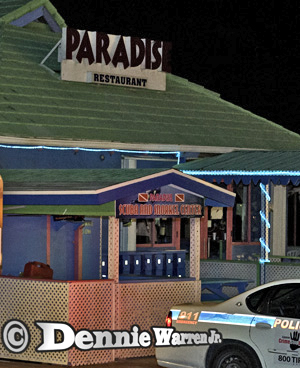
Burglar gets ‘cold welcome’ from restaurant staff
 (CNS): Police were on the scene at a harbour front restaurant in George Town in the early hours of Sunday morning after staff trapped a would-be burglar in the kitchen’s refrigerator. After catching the burglar in the act, staff at Paradise restaurant on South Church Street reportedly held the villain in the walk-in fridge until local law enforcement officers arrived at the location, where the man was allegedly arrested. Police have not yet confirmed details of the arrest. Meanwhile, CNS has also received unconfirmed reports of two assaults in the early hours of Saturday night which are said to have take place inside and outside a George Town nightclub. (Photo Dennie Warren Jr)
(CNS): Police were on the scene at a harbour front restaurant in George Town in the early hours of Sunday morning after staff trapped a would-be burglar in the kitchen’s refrigerator. After catching the burglar in the act, staff at Paradise restaurant on South Church Street reportedly held the villain in the walk-in fridge until local law enforcement officers arrived at the location, where the man was allegedly arrested. Police have not yet confirmed details of the arrest. Meanwhile, CNS has also received unconfirmed reports of two assaults in the early hours of Saturday night which are said to have take place inside and outside a George Town nightclub. (Photo Dennie Warren Jr)
Police have not yet confirmed the details but CNS has been informed that a woman was assaulted inside the club with a bottle and a man was stabbed outside the same nightspot.
CNS also understands that Travel Pros & Aladdin Tours on Dr Roys Drive were also targeted over the long weekend holiday break. The office glass was smashed but the burglars or vandals got away before the police arrived.
Check back to CNS later for more details on this and other crime related stories over the holiday weekend.
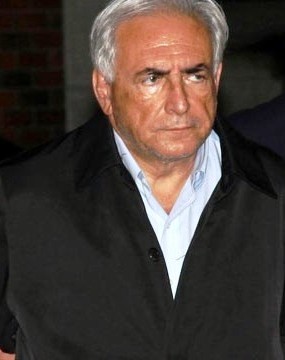
IMF boss charged with sexual assault in NY court
 (Bloomberg): International Monetary Fund chief Dominique Strauss-Kahn appeared in court for the first time since he was pulled off a plane May 14 in New York and accused of trying to rape a hotel maid. Strauss-Kahn, who was taken into custody aboard an Air France flight at John F. Kennedy International Airport as it prepared to depart, was escorted into Manhattan criminal court this morning. Prosecutors asked the judge that the IMF chief be held in custody until trial. He faces as many as 25 years in prison if convicted of the most serious count, prosecutors said. The IMF chief is also charged with unlawful imprisonment and a criminal sex act.
(Bloomberg): International Monetary Fund chief Dominique Strauss-Kahn appeared in court for the first time since he was pulled off a plane May 14 in New York and accused of trying to rape a hotel maid. Strauss-Kahn, who was taken into custody aboard an Air France flight at John F. Kennedy International Airport as it prepared to depart, was escorted into Manhattan criminal court this morning. Prosecutors asked the judge that the IMF chief be held in custody until trial. He faces as many as 25 years in prison if convicted of the most serious count, prosecutors said. The IMF chief is also charged with unlawful imprisonment and a criminal sex act.
A potential candidate for the French presidency, Strauss-Kahn, 62, has denied the charges and will plead not guilty, his lawyer Benjamin Brafman has said.
The alleged attack on a 32-year-old woman at a Sofitel hotel in midtown Manhattan occurred May 14, according to the New York Police Department. Strauss-Kahn was picked out of a line-up by the maid, police said.
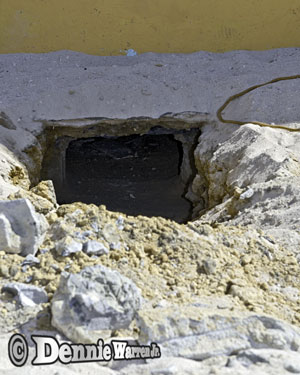
Burglars tunnel in to bank
 (CNS): Police have confirmed an attempted burglary has taken place at the Butterfield Bank at the Compass Centre in George Town. Details of how the villains broke into the bank have not yet been confirmed but reports suggest that they may have tried to tunnel into the bank’s vault via the northside of the buiding. Police did say that the report was made at around 10am Monday morning but it is not clear when over the weekend the burglars had broken into the premises. This bank was also targeted by armed robbers at the end of last year, when three men wearing Halloween masks walked into the bank in the middle of the day and fired a shot into the ceiling. (Photo Dennie Warren Jr)
(CNS): Police have confirmed an attempted burglary has taken place at the Butterfield Bank at the Compass Centre in George Town. Details of how the villains broke into the bank have not yet been confirmed but reports suggest that they may have tried to tunnel into the bank’s vault via the northside of the buiding. Police did say that the report was made at around 10am Monday morning but it is not clear when over the weekend the burglars had broken into the premises. This bank was also targeted by armed robbers at the end of last year, when three men wearing Halloween masks walked into the bank in the middle of the day and fired a shot into the ceiling. (Photo Dennie Warren Jr)
The robbers in that incident ordered everyone to the ground before fleeing with an undisclosed amount of cash and, despite a reward of $US50,000 being offered, no arrests have be made in connection with the crime.
The bank was closed Monday for the Discovery Day holiday.
Check back for more details later.
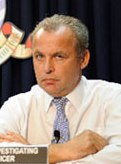
Tempura players involved in local compliance reports
 (CNS): The former Scotland Yard cop who led the discredited police corruption investigation along with a UK lawyer who was struck off for his role in the unlawful arrest of a Cayman Grand Court judge have both been involved with compliance reviews of the Cayman Islands for the British government since leaving the islands. According to the Department for International Development in the UK, SIO of Operation Tempura, Martin Bridger, and the legal adviser to the investigation, Martin Polaine, have been employed to work on evaluations of Cayman’s compliance with various international regulations regarding corruption.
(CNS): The former Scotland Yard cop who led the discredited police corruption investigation along with a UK lawyer who was struck off for his role in the unlawful arrest of a Cayman Grand Court judge have both been involved with compliance reviews of the Cayman Islands for the British government since leaving the islands. According to the Department for International Development in the UK, SIO of Operation Tempura, Martin Bridger, and the legal adviser to the investigation, Martin Polaine, have been employed to work on evaluations of Cayman’s compliance with various international regulations regarding corruption.
The two men were reportedly given contracts by the UK government via Amicus Legal Consultants, now known as SBP (Sambei, Bridger and Polaine, a legal and law enforcement consultancy firm) assessing the UK’s Overseas Territories and Crown Dependencies' compliance with anti-corruption conventions in early 2008 and again in mid-2009.
In response to an enquiry made by John Evans, who was a witness in one of the Operation Tempura’s failed court cases, DfID said that Bridger and Polaine were involved in assessments and updates on progress of the OT and Crown Dependencies’ compliance with the Council of Europe Conventions on Corruption, the Organisation for Economic Cooperation and Development's Convention on Combating Bribery of Foreign Public Officials in International Business Transactions and the United Nations Convention against Corruption.
Bridger was asked to leave the Cayman Islands at the start of 2009 as the then PPM government said at the time that the investigation he had led was “a disgraceful and terribly damaging episode in Cayman’s history,” and he eventually left in the spring of 2008. Later that year Polaine lost his licence to practice as a lawyer following the advice he gave to the Operation Tempura investigators. Polaine was struck off not least because of what turned out to be the unlawful arrest of the Justice Alex Henderson, a local Grand Court judge, who was awarded $1.25 million in damages as a result.
Despite three court room cases, the removal of the former police commissioner and deputy commissioner from their jobs, whose cases have still not been settled and some $7 milllion spent from the public purse, the investigation did not reveal any evidence of corruption in the local police or judicial system.
In the wake of a decision by Sir Peter Creswell, who declared Henderson’s arrest unlawful, in which he said Bridger and the Tempura investigation team had themselves abused the process in 2008, the opinions of Bridger and Polaine in regards to the Cayman Islands and issues of corruption were still sought and paid for by the UK government. The men also list the work they did with the UK government on their website, in which they offer their services as international law enforcement consultants.
Last year Bridger and Polaine had filed a complaint with the Foreign and Commonwealth office in London regarding the closing of the Tempura investigation, which was dealt with by the current governor, Duncan Taylor, who rejected the complaint. However, the reasons for the rejection have not been made public, despite FOI requests made both here and in the UK.

Local chamber invited to talking shop on development
(CNS): The Cayman Islands Chamber of Commerce has been invited by Caribbean Central American Action (CCAA) and theInter-American Development Bank (IDB) to be a part of a panel discussion for the IDB International Forum on Caribbean Investment and Development (IFCID) in Washington DC next month. This is the first time the body which represents the interests of the private sector has been asked. Chamber President James O’Neill and Chamber CEO Wil Pineau will be discussing “Public Private Cooperation on Business Risk” focusing on the effects of disaster management and crime, on doing business in the region.
“The Chamber is very pleased to have been invited to contribute to this important regional conference,” Chamber President James O’Neill. “It’s an excellent opportunity for us to impart information and experiences as well as learn from our neighbours who share similar concerns and issues. I look forward to representing our members in a meaningful way as we work to maintain a high standard of quality in our community and economic development.”
The panel will answer questions from the audience made up of business leaders, financial institutions, and policy makers from the Caribbean, North America and beyond “in order that they may give their insight to what best practices should be implemented at a local level for effective results,” the chamber stated in a release.
The conference itself will look at business and economic development in the Caribbean, providing participants with a mix of business networking and policy dialogue. The format is designed to encourage both information-sharing and audience participation to offer value to people already doing business in the Caribbean, those who are looking for opportunities, and those who are involved in economic policy making in the region, the chamber said.
Speakers invited to the forum include Canadian government members Peter Van Loan, minister of international trade, Michael Lee Chin from Portland Private Equity, Thomas Adams, the US special coordinator for Haiti, Cornelius B. Prior, Jr., the chairman of the, Caribbean Central American Action and Luis Alberto Moreno, Inter-American Development Bank’s president.
Travers leads Cayman pack in most influential list
(CNS): Although he stepped down as the chair of the local indsutry body, Cayman Finance, in February, Anthony Travers, the chair of the Cayman Islands Stock Excahnge and former partner with Maples and Calder, is still considered the most influential person in the Cayman Islands when it comes to the financial sector. In the list of 'The 500 most influential people in the world’s financial centres', published by Financial Centres International, Travers made it in at number 95, ahead of George McCarthy and Cindy Scotland, the chair and MD of CIMA, as well as the country’s premier and minister of finance.
However, McKeeva Bush is listed in 113th place, ahead of finance ministers from most of the world’s offshore financial centres, with the exception of Hong Kong, Singapore, Qatar and Luxembourg. McCarthy is listed at 240 and Scotland at 247. Other Caymanian based financial players on the list include Grant Stein, the Global Managing Partner of Walkers Global, who made the list at 214, and Henry Smith, Global Managing Partner at Maples and Calder, also makes the list at 294.
Richard Murphy, the founder and director of the Financial Secrecy Index and a long time critic of offshore centres such as Cayman, also made the list at 485.
Published by Financial Centres International, a monthly periodical covering developments in the world's financial centres, the inaugural ‘FCI 500’ is described as “a first insight into the people, the forces, and the institutions that are behind the unprecedented re-shaping of the global financial system,” in the wake of the credit crisis which started in 2007.
Top of the list is Mario Draghi, Governor of the Banca d'Italia, followed by Timothy Geithner, Secretary of the Treasury at the US Department of the Treasury, and at number three isBarney Frank, Congressman at the United States House of Representatives, who is followed by Dominique Strauss-Kahn the Managing Director of the International Monetary Fund.
“This inaugural ‘FCI 500’ is not just another list of influential people,” FCI stated. “The top names in the FCI 500 reflect the position of those with global mandates, such as Mario Draghi, and the managing director of the IMF, as well as the biggest players in multinational financial services companies.”
The list is not, FCI stated, a list of the most influential people in world finance. “It is a list of the most influential in financial centres. The point is that, in the end finance is a network business operating through a network of independent jurisdictions. The 'FCI500', then is intended to recognise the key players in jurisdictions across the globe, and the key sectors and activities making up that list,” FCI added.
The list took almost two years to compile, publishers revealed, adding that they would continue to revise and renew the list going forward.

The Faces of Corruption
The 2009 Constitution, which one very prominent politicianhas repeatedly indicated he did not support, created a Commission for Standards in Public Life tasked, “to support and enhance democracy in the Cayman Islands and to promote the highest standards of integrity and competence in public life in order to ensure the prevention of corruption or conflicts of interest.” Events since 2009 suggest that if this body exists in more than name, then it has a great deal of work to do.
It is time for an open and very public debate regarding the standards which our politicians will be required to meet by the electorate. Politicians simply cannot be allowed to set and enforce their own standards, particularly given what we has occurred in recent times. Our country is far too precious. We cannot allow it to be bartered for a container load of appliances or short haul flights on private jets.
Ideally, the Standards Commission would publish a discussion document setting out a detailed draft set of explicit standards and would then lead an open public debate on what standards politicians ought to live up to. Unfortunately, there is little evidence that there is any will to do so. Challenging the actions of politicians, corrupt or otherwise, requires personal strength. In an environment polluted by corruption, patronage, and threats, it also requires sufficient determination to face the potential retribution which corrupt politicians almost always threaten in order to maintain the flow of illicit benefits for which they and their cronies entered public life.
Despite the absence of an official debate, a debate is nevertheless taking place. Corruption and patronage are being challenged in the media, at family gatherings and on the marl road. Buffoonery and corruption are mocked in online commentaries. These challenges are coming from many sources. Young educated Caymanians are appalled at seeing their futures sold off. Middle aged Caymanians are tired of seeing their hard earned money wasted on extravagance, and older Caymanians remember when public minded individuals freely gave of their time to serve in the Legislative Assembly for no pay other than the chance to do what was right for their society. The challenges, at first ignored, are now being met by politicians and their hangers-on who feel that their private interests are threatened.
Not all politicians are corrupt, either in Cayman or elsewhere in the world. Wherever it happens in the world, overt corruption can be identified with relative ease by using no more than common sense. Suspect politicians, their apprentices, their handlers and their cronies seek the ability to manipulate public policy, public procurement and public largess for their own private gain. Any one of the following acts should ring alarm bells and send up red flags.
They spend public funds for the private benefit of themselves and their supporters, and then justify their actions by saying that some other politician of equally challenged morality did the same thing at some point in the past. They prevent sustainable development in favour of poorly thought out schemes which enrich politicians and their cronies in the short term. They are happy to offer up the environment for destruction for their 30 pieces of silver. They fabricate the existence of non-existent provisions in a constitution in order to justify their predatory excess spending from the public purse. They ignore the time honoured separation of the judicial, administrative and political branches of government in order to get whatever they or their cronies or handlers want. They make completely irrelevant comparisons with supposed past events to suggest that they are justified in ignoring the rules and ignoring the separation between public benefit and private benefit whenever paving something will get them a vote or two.
They present themselves in courts of justice to leave no doubt about which way those entrusted with decisions are to render their decisions.They ignore the requirements of procurement laws. They trade favours and give concessions which cost the public purse in exchange for money or property or contracts which provide private benefit. They appoint persons to public authorities and boards in a system of barter for private gain. They ignore elections laws and the provisions of their constitutions. They rail against freedom of the press and freedom of information which might expose corrupt practices. They threaten to use the authority they have been givento do public good, to change laws so as to silence journalists and deny the public access to information which may disclose corruption. They use public funds to provide cronies with high paying non-jobs as “advisors” and “consultants”. They pay for the expenses of their election campaigns by awarding “non-jobs” and “no real purpose” contracts paid for with tax dollars once they are elected. They use public funds to hire the relatives of supposedly neutral decision makers to do “non-jobs” in order to ensure that the media is stifled and that corruption is less likely to be exposed in the proceedings of democratic institutions. In short, corrupt politicians are a threat to every society and should be labelled and shunned as such.
Corruption is corruption wherever it may be found. A great deal of work has been done in identifying corrupt practices in democracies around the world. We have the option of looking at how corrupt practices and abuse of public office have been defined and dealt with in Commonwealth countries including the United Kingdom, Canada, Australia, New Zealand and elsewhere. We have the option of looking at the public work of international organisations such as Transparency International. We have clear statements from world leaders such as Kofi-Annan, former Secretary General, United Nations, who wrote that corruption "debases democracy, undermines the rule of law, distorts markets, stifles economic growth, and denies many their rightful share of economic resources …”
We also have the words of the current UN Secretary-General Ban Ki-Moon, who has written, “Corruption undermines democracy and the rule of law. It leads to violations of human rights. It erodes public trust in government. It can even kill.” We also have concrete examples of how non-corrupt politicians act, in relation to judicial proceeding and otherwise, in democracies around the world.
In the absence of any discussion document from the Standards Commission, set out below is one potential list of questions which hopefully will widen the public debate of what constitutes a corrupt political practice and who might be corrupt. Any politician engaged in corrupt practice is corrupt and should not be permitted to hold any public office. It is as simple as that. Keeping that in mind we need to ask ourselves the following;
Is it a corrupt practice for a politician to steal, waste or otherwise use public funds for personal benefit?
Is it a corrupt practice for a politician to use public funds to directly or indirectly buy votes?
Is it a corrupt practice for a politician to directly or indirectly interfere in judicial proceedings?
Is it a corrupt practice for a politician to directly or indirectly sell or barter appointments to public authorities or public boards?
Is it a corrupt practice for a politician to directly or indirectly provide duty, tax or other concessions which cost the public purse in exchange for direct or indirect personal gain?
Is it a corrupt practice for a politician to directly or indirectly use public funds to manipulate notionally independent decision makers in our democratic institutions?
Is it a corrupt practice for a politician to directly or indirectly intimidate or victimise civil servants who refuse to collaborate in corrupt or unethical activities?
Is it a corrupt practice for a politician to directly or indirectly award “non-jobs” at public expense as payment for political support or work done in political campaigns?
Is it a corrupt practice for a politician to directly or indirectly accept kickbacks from developers or financial institutions granted favourable decisions or contracts by the political arm of government?
There are many other questions which also need to be explicitly asked and explicitly answered in order for the Cayman Islands to begin to prosper as a corruption free society. It is also likely that we will need to re-write some of our laws relating to corruption and abuse of public office as the ones our politicians have enacted offer too much latitude to the corrupt and insufficient punishment. We need to think of systemic political corruption as the form of organised crime which it is and we need to treat it the way such a cancer should be treated.
For far too long we have been naive in relation to what motivates some who aspire to political life, and we have been too willing to turn a blind eye when a politician "took a lil piece for his seff". It should be no wonder that some of them now think that they, the politicians and their cronies, are entitled to everything with the public being left with not even a "lil piece" of the benefits flowing through this country. The standard of politician we have been willing to accept has been far too low in the case of some, and we have not valued the honesty and integrity of other politicians enough.
Hopefully as we go forward as a society, every person will look at each questionable action of a politician and will ask, “Why is this being done, and who is benefiting?” The more these questions are asked and the more forceful we are in letting politicians know that corrupt practices will not be tolerated, the less common corruption will be. In 2 years or less we will have the opportunity to vote for politicians who have not shown themselves to be corrupt. In the time leading up to that election we need to shine as much light on corrupt practices as possible. That is the best hope for the long term future of this country.

Woman faces attempted murder over stabbing
 (CNS): A thirty three year old West Bay woman is now facing attempted murder charges following an altercation on Tuesday night in Dixie Lane at around 9pm. The woman is accused of stabbing a 57 year old man in the chest during the incident. The injured man was taken to George Town Hospital by the emergency services where he was treated for injuries which were described as non-life threatening in a police report. At the time officers arrested the woman on suspicion of Assault GBH, police have not named the woman nor have they confirmed her relationship to the victim.
(CNS): A thirty three year old West Bay woman is now facing attempted murder charges following an altercation on Tuesday night in Dixie Lane at around 9pm. The woman is accused of stabbing a 57 year old man in the chest during the incident. The injured man was taken to George Town Hospital by the emergency services where he was treated for injuries which were described as non-life threatening in a police report. At the time officers arrested the woman on suspicion of Assault GBH, police have not named the woman nor have they confirmed her relationship to the victim.
The woman is expected to face the attempted murder charges formally in court on Tuesday morning (17 May).

CUC’s temporary generator in smoke scare
 (CNS): The local power company has confirmed that no one was hurt during an evacuation at the plant as a result of what turned out to be an oil leak, yesterday. A spokesperson from CUC explained that just after 1:00 pm on Friday the Cayman Islands Fire Department attended the power plant in response to smoke which was emanating from a small oil leak in a temporary generator unit located adjacent to Sparky Drive. The firm said the smoke had died down before the fire crews arrived on the site. “This minor incident has not affected the company’s generation capacity and the unit should be back in service in a few days following inspection,” the spokesperson said. (Photo Dennie WarrenJr)
(CNS): The local power company has confirmed that no one was hurt during an evacuation at the plant as a result of what turned out to be an oil leak, yesterday. A spokesperson from CUC explained that just after 1:00 pm on Friday the Cayman Islands Fire Department attended the power plant in response to smoke which was emanating from a small oil leak in a temporary generator unit located adjacent to Sparky Drive. The firm said the smoke had died down before the fire crews arrived on the site. “This minor incident has not affected the company’s generation capacity and the unit should be back in service in a few days following inspection,” the spokesperson said. (Photo Dennie WarrenJr)
“There was no injury to any of our personnel or damage to any other equipment. There were no outages as a result of the excessive smoke,” CUC added.
The generator is a one very recently leased by the power company to help fill it generating capacity gap. The power firm has recently experienced of a number of major mechanical failures on various generators as well as a serious explosion in one unit at the beginning of the year.